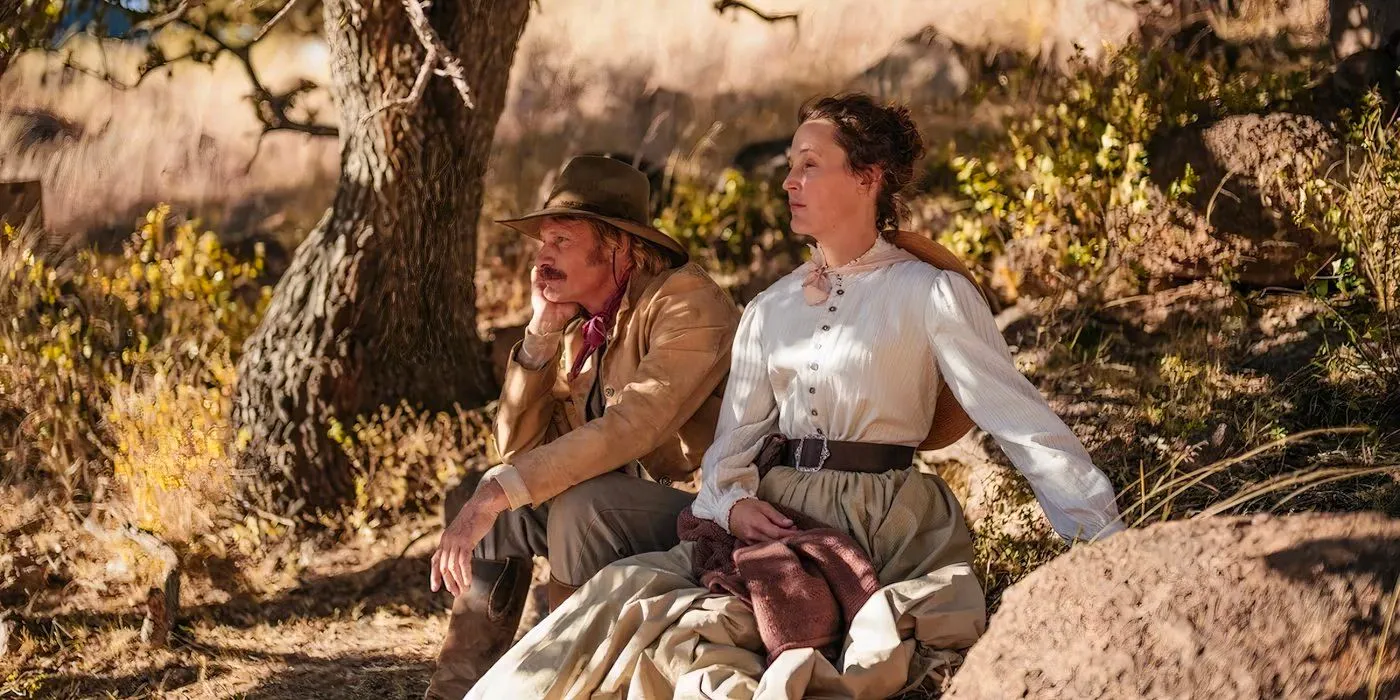The intentions and execution of The Dead Don't Hurt do not match
Mortensen obviously wants his Western to be conscious of the reality of this era, to be proactive in not only vocalizing what the issues were of this time for women and racial minorities but also actively work against these shortcomings by outright acknowledging the time period as incredibly racist, sexist and cruel. Creating a work that embraces these facts and generates something positive and uplifting and replicating the same humiliations onscreen while merely noting that it's horrible differs greatly, though.
The Dead Don't Hurt is a classic example of doing the bare minimum to minimize the problems of authenticity and genre reinventions; thus, Mortensen wants to claim this story as some sort of Feminist Western without really working to create a Western that honors and uplifts the feminine experience.
Vicky Krieps The Dead Don't Hurt's Saving Grace
The script by Mortensen lacks vitality and inventiveness. The Dead Don't Hurt's best is not on the page; it's the chemistry between Mortensen and Kriples. Since the emotional core of the movie is romance, the sequences between the two are real and novel. Though the movie's non-linear approach is awkward, its direction by Mortensen is masterful. Marcel Zyskind boldly pushes the movie into viewable terrain by masking the shortcomings of the storyline with his amazing photography. As a director, Mortensen's abilities certainly show development as he tries to portray a relatively delicate relationship regrettably hampered by violence and death.
The Dead Don't Hurt is not the great exception to the rule as having a woman as the story center does not exonerate it of its needless blunders. The non-linear arrangement drives away rather than attracts us. This movie doesn't challenge Western clichés and archetypes, hence there isn't much to applaud about it either. Its Feminist approach of the Western is not more ambitious either. Rather of a woman just suffering, Mortensen compares advancement with a woman suffering elegantly. Vivienne is an exception since her spirit is not totally destroyed; she isn't quite deleted.
The Dead Don't Hurt: a Feminist Western Not Quite Delivered
Viggo Mortensen transports us to the Western frontier of the 1860s for a narrative as romantic as it is tragic and as sensitive as it is savage. The Dead Don't Hurt centres Danish immigrant Holger Olsen (Mortensen), a carpenter who makes his life. The somewhat reclusive discovers his life transformed when he develops feelings for Vivienne LeCoudy (Vicky Krieps), a French Canadian immigrant living against social norms. When Olsen chooses to fight with the Union, the couple discovers their love tested; Vivienne is left to fend for herself in a town rife with corruption and violence.
Though with a Feminist spin, Mortensen's most recent directorial attempt explores several fundamental themes of the long-standing genre. It emphasizes the romance and female lead instead than the conventional good man against wicked man. Actually, the suggested romance shapes the third act's shoot "em up". Brilliant actress Krieps is definitely the highlight of this film. The Dead Don't Hurt falls short of Mortensen's vision with such a force onscreen and a famous skill at hand.
The main problem of the movie
The Dead Don't Hurt is a vision of a passionate woman resolved to stand up for herself in an unforgiving society governed by merciless men, both a tragic love story and a subtle portrayal of the battle between revenge and forgiveness.
The Dead Don't Hurt exists mostly to demonstrate that it is not like other Westerns. Still, the only quality that is appreciated is Vivienne's strong woman nature. She is defined by this and the guys in her life. Her story is shaped by her relationship with Olsen and her abusers; so, this is not the feminist triumph on its own. When Vivienne isn't the target of love, violence, or bigotry, Krieps has such a clear image of who she is. Her eccentricities and subdued authority finally turn the movie in the direction Mortensen felt he was headed.
Where The Dead Don't Hurt Went Correctly
Seeing The Dead Don't Hurt made me think of the miniseries Godless, which chronicles the tale of a little mining village that unexpectedly turned into the western Garden of Eden after all the men perished in an accident. The show was more about how these women survived in the absence of men and not how they would live in spite of them, even while it featured moments stressing the power and resiliency of women.
Since both this show and The Dead Don't Hurt follow the same trap of not being able to create a Western that does not have their key women characters wholly dependant on the males around them to shape their image and story arc, I couldn't help but discover great similarities between them.



